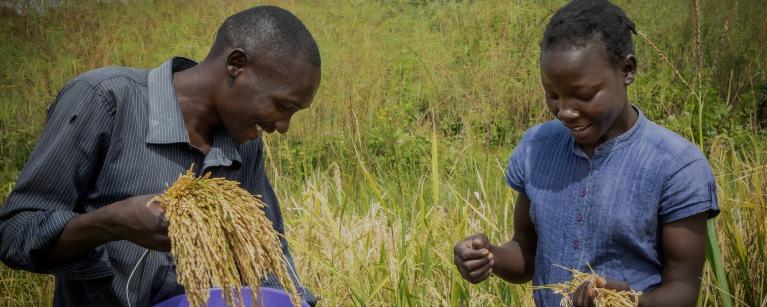Saba Josiah, aged 22 and his wife Tiko Gladys are residents of Okaiva village in the Arua district who participated in the Youth Engagement & Empowerment (YEEP) Project.
Following the death of his parents, Josiah, now a father of two married Tiko Gladys but later realised they were both in for a struggle as they grappled with unemployment.
In Uganda, there is a general social tendency towards a prolonged transition to adulthood for young people, and studies have shown an increasing number of vulnerable youths who require support to transition into adult life especially orphans and vulnerable children who are left in a disadvantageous position compared to their peers.
For Josiah, the loss of both his parents was devastating and out of grief and need for companionship, he married 14-year-old Tiko Gladys.
Unfortunately, he realized his mistake too late when the young couple started grappling with unemployment.
Before being enrolled in the YEEP project training, the young family relied on subsistence farming to meet their daily food requirements. However, they consistently faced challenges with low agricultural yields, often struggling to harvest enough crops to sustain themselves due to the use of poor farming methods and unpredictable weather patterns."
This is why when the LC1 chairperson of Okaiva village Mr Fema Phlianm nominated the couple to International Foundation for Recovery and Development (IFRAD) as suitable participants in YEEP training, they didn’t hesitate to participate.
Tiko acquired entrepreneurship skills and learnt how to bake cakes, make sim-sim snacks, and liquid soap among other skills.
To improve their yields, they were advised to grow crops that take a shorter time to harvest yet bring in a lot of yields like sweet potatoes which they quickly adapted.
CLIMATE SMART AGRICULTURE (CSA)
However, it was the training in Climate Smart Agriculture (CSA) approaches that enabled the couple to move away from subsistence farming.
Climate Smart Agriculture is a holistic approach to farming that aims to increase food security and reduce poverty in the face of a changing climate.
They acquired skills in using sustainable farming practices that increase the resilience of crops and ecosystems, while also reducing greenhouse gas emissions and increasing carbon sequestration.
Josiah and Tiko transitioned from subsistence farming by applying the CSA practices on their farm and were amazed by the results.
They started by applying crop rotation, where they grew different crops in the same field in different years, which helped to improve soil health and increase crop yields.
They also planted trees around their farm, which helped to retain moisture in the soil and provided shade for their crops.
“I introduced minimum tillage and cover cropping which helped to reduce soil erosion and increase soil organic matter. Josiah said.”
Their farm production increased which helped the young couple to diversify their income. They started to grow new crops including Cassava, Rice, Sugarcane, and Tomatoes that they would sell at the local market.
Using the extra income, Josiah was able to construct a 1000-fish capacity pond which he manages together with his wife. His farm is now able to feed his family but also generates extra income which is saved up in their VSLA group.
At the end of every training, the youth are connected to a savings group (VSLA) so they can save the extra income which they can use to expand their businesses through the provision of loans. Josiah’s village savings and loans association called "Never Give Up," provided the couple with a loan of up to UGX 100,000 (Approximately €25) which they used to lay bricks that were later sold for a profit.
With a stable income, Josiah plans to take his wife Tiko back to school to pursue her education, even though he has been getting pressure from his in-laws to pay her dowry. He hopes that Tiko’s parents will give him time, to enable his wife to complete her education. “I can handle dowry later”. Josiah says.
YEEP is a three-year project funded by the European Union that is being implemented by Oxfam in partnership with (IFRAD) and African Youth Development Link (AYDL) in the 4 northern Uganda districts of Oyam, Gulu, Arua, and Nebbi targeting 2000 youth both in and out of school with an overall goal to improve youth livelihoods and participation in governance and development processes in Uganda.
